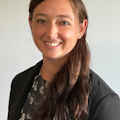What is it like to be a female in the automotive industry?
According to the U.S. Bureau of Labor Statistics, the percentage of women in the automotive repair and maintenance industry was 9.9 percent as of 2019, up from 7.3 percent in 2015 and 1.4 percent in 1999. Although it has been a steady progression, the once notoriously male-dominated industry is continuously showing growth for women.
Denise Caspersen, director of remote calibrations at asTech, and Dara Goroff, senior vice president of global development at Repairify Solutions, shared their experience on how they got started in the field, what it’s like to be a female in the automotive industry, and advice for other women looking to get into the industry.
"I feel it’s important to share, not just my, but ALL, successful career stories with other women interested in technology and the automotive industry,” Goroff said. “It allows women entering or transitioning into this industry to understand that their path is limitless and that as long as they have drive, they will get where they want to go."
In their leading positions, Caspersen helps facilitate remote calibrations across 23 countries around the world to ensure vehicles return to OEM standards. Goroff and her team comprised of product managers, software engineers, quality assurance members, application development engineers, and data science (predictive analytics and business intelligence) members collaborate to create products and solutions for the U.S., Canada, and across Europe.
What made you decide to get into the automotive industry?
Caspersen – I’ve always liked cars. I had a 1980 Datsun 210 and would just learn whatever I could. I taught myself how to change the oil as well as some general maintenance. As a kid, I would get into trouble a lot because I liked to take things apart and put them together. It was always in my nature to be a mechanic if I could’ve been one but that really wasn’t the path that I was presented. Throughout college, I did a lot of research. I ended up at the Automotive Service Association (ASA), doing research for them. It was non-tactile but focused on automotive and then that led me to become focused on the collision repair side. I spent quite a few years with collision repair shop owners and the problems that they had to solve for the industry. Then I got involved in associations such as CIECA and the Women’s Industry Network. Six years ago, I was fortunate to join asTech to focus on the electronic repair side of the automotive industry.
Goroff - I kind of fell into the automotive industry unexpectedly. In high school, I had a group of friends whose parents owned local collision repair shops and mechanical repair shops. Over the weekends I would hang out with them in their shops, and we would work on cars together. Some of my friends had drag-racing vehicles so we would go to the drag strips in Wisconsin. It was really a fun thing for me. After my education, I just so happened to have a friend working at Motorola and I ended up getting recruited to do customer and tech support and ended up in the automotive industry. First, I supported cellular phones that were fully installed in vehicles and then secondly, land mobile products. I started in the adjacency of the automotive industry and then literally every job that I had, whether it was in an insurance vertical or creating products that helped insurance claims, was vehicle related in some way or another.
What is it like to be a female in a male dominated industry?
Caspersen – It was intimidating at first. Intimidating because you’re a different object in a room of people. You’re the minority. But how you present yourself and how you prepare yourself allows your gender to go away. It starts out being a bit complicated and unsettling because no one looks like you, but it’s your confidence from knowing what you’re talking about and having that research or understanding of the industry that will get some of the folks in the room to see you as a person of information, trust, and credibility. The differences go away. It was always fun initially to surprise people because they didn’t expect me to know things. I was fortunate to have male and female mentors who accepted who I was as a person.
Goroff – I came into the automotive industry through a technology path. When I started out at Motorola taking calls, there was a good balance in male and female employees because we started out supporting technology. When I started getting more into the software development and product management side of things was when I realized that sometimes I would be the only woman in the room. I think the truth is, by the time I got into that world I realized that sometimes being unique is actually good. If you worked hard to develop your own expertise and feel confident in what you know sometimes you blow away all stereotypes and preconceived notions because you can engage in the same level of passion and conversation as anyone else in the room regardless of their background, sex, and education. It can be really beneficial to not be like everybody else in the room. I want to encourage any woman that if you’re interested in a pursuit that is considered more male-dominated, whether it be software development, engineering, or automotive, get your foot in the door and learn as much as you can about it. If you’re truly interested, that creates passion which creates expertise and confidence and that gives you the leg up.
What advice would you give other women looking to get into the automotive industry?
Caspersen – If you love something or want to do something, you have to start. Don’t be afraid to fail or be challenged. Start, do your research, apply it, find mentors, and keep moving forward. I always felt that mentors were essential to advance in the automotive industry or any industry once you pick your career path. Mentors are extremely vital. A mentor could be anyone from your location who you respect...someone that you can confide in and learn from. It could also be someone from an association. I’ve found mentors both at work and in associations. The Women’s Industry Network is a combination of all different segments in the collision repair industry, so I have mentors at high levels at various fields that are not even connected to mine but are connected in a bigger, broader scope.
Goroff - One of the things that I try to tell folks is not to be afraid to get started and to get your foot in the door. If you think you’re interested in something, find a toehold. Offer to potentially volunteer if you can’t get a job directly or intern with the company. Once you’re there, the most important thing to do is to build your own credibility by really emerging yourself and to really truly learn something. Then, when you feel like you really know something then you should put your hand up and volunteer for things that you don’t know. You can get very stagnant if you keep doing exactly what you know. If you want to advance, you need to continue to put your hand up and say, “I may not know how to do this, but you know I know how to do that so give me a chance to try.” Don’t be afraid to fail and know that as long as you’re adding value either for your employer, career path, or customer you’re going to continue to move forward. My biggest advice for woman getting into the industry is self-sustain. Mentorships are great to get advice, guidance, and to have someone who is unbiased that you can bounce things off of. But self-sustain within your own world so you always have your own knowledge base to fall back on and you always have your confidence in your own abilities. That will carry you - even if you decide in five years to make a career jump to the unknown. If you don’t build your own strengths, you won’t feel good enough to do that. Always invest in yourself. The sky is the limit.
About the Author
Kayla Nadler
Associate Editor | Vehicle Repair Group
Kayla (Oschmann) Nadler was previously an associate editor for the Vehicle Repair Group.
With an education in journalism and public relations, Nadler contributed to Professional Tool & Equipment News (PTEN) and Professional Distributor magazines, as well as VehicleServicePros.com.

